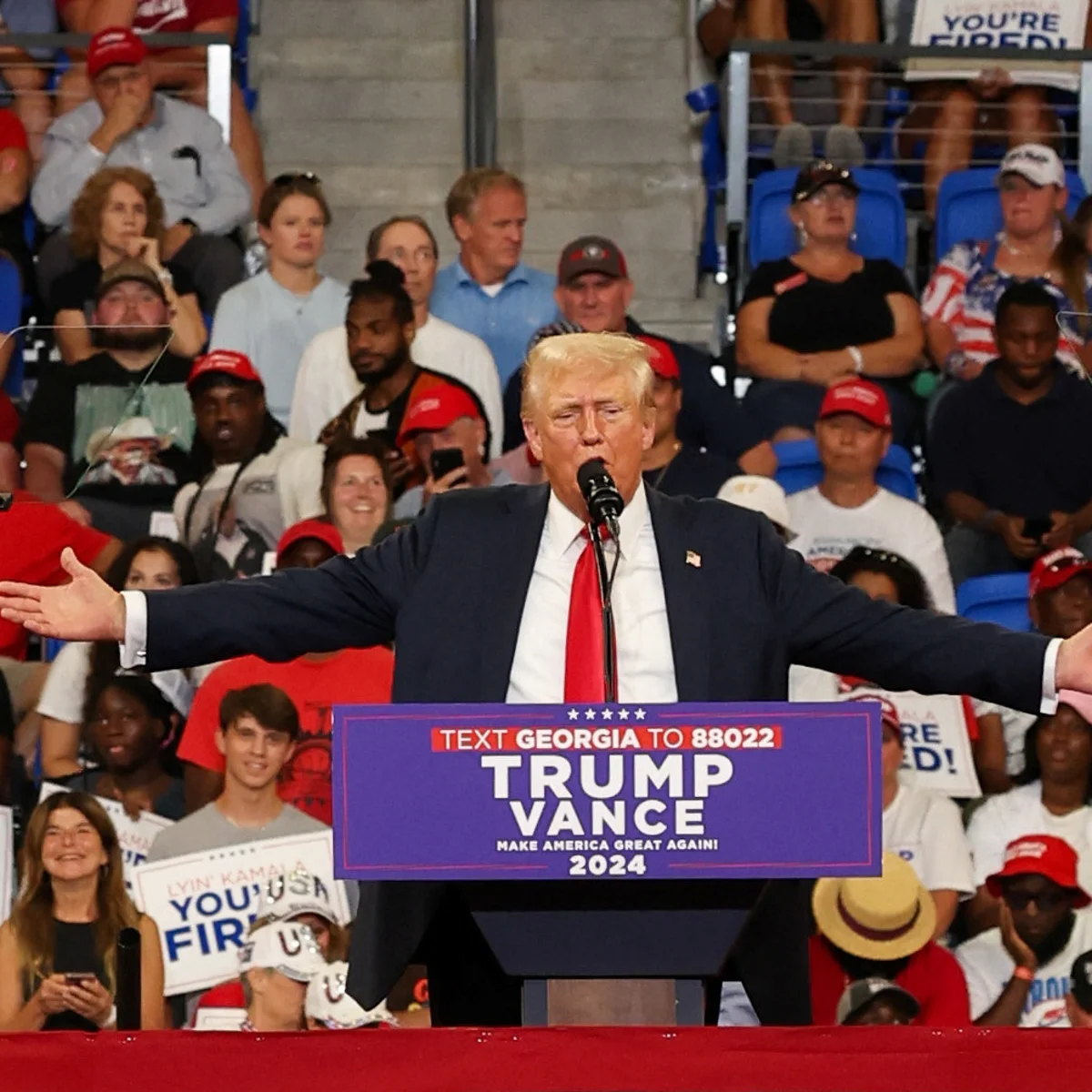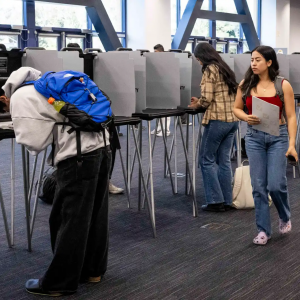“CEASE & DESIST,” former president Donald Trump began in a statement on TruthSocial. “Please be aware that this legal exposure extends to Lawyers, Political Operatives, Donors, Illegal Voters & Corrupt Election Officials,” he wrote, adding that these people “will be sought out, caught, and prosecuted at levels, unfortunately, never seen before in our Country.” Just three days before his first debate with Democratic presidential candidate Kamala Harris, Trump made one of his most direct vows to prosecute those who contradict him politically. If Trump were to follow through on this assertion, he would effectively fulfill his promise of imprisoning his political enemies based on unfounded claims of election interference.
Trump has an exhaustive record of claiming to be reinstalled as the justified winner of the 2020 election, and threatening political rivals. He is the first president in American history to face several indictments for trying to interfere with the election process, and has displayed the same behaviors as the leader of a cult of personality. Meanwhile, The Heritage Foundation (the conservative think tank which developed the controversial Project 2025) has proposed more than 100 lawsuits regarding the efficacy and reliability of the 2020 election results. Additionally, Lara Trump, co-chair of the RNC, appointed former OAN reporter Christina Bobb to be head of the election integrity commission of the committee. Bobb has been in for trying to promote a slate of Trump electors in Arizona despite the fact that Biden won the state.
What this would look like
If these threats came to fruition, the US government could be weaponized as a tool to construct and maintain political homogeneity. The right to free speech would be violated, as prominent officials of the Democratic party, election integrity committees, the DOJ and other legal organizations can’t assert that claims of 2020 election fraud are false, due to potential fear of repercussions or retaliations. In addition, political workers who were involved in the election process would (according to the TruthSocial post) be unjustly imprisoned for committing fraud, despite the fact that several rigorous and thorough investigations proved that this had not occurred.
By imposing consequences on his political enemies, Trump destroys the legacy of the Constitution while silencing the voices of millions of Americans who exercised their enumerated and democratic rights by voting in the 2020 election. Conclusively, the judicial and bureaucratic branches of the American government could be exploited to favor one particular, unfounded political ideology (favoring MAGA Republicans’ unfounded claims that the 2020 election was “stolen”) while crushing dissent among the opposing parties who accurately uphold the claim that no election interference occurred.
Trump, who claimed in a 2024 Fox News interview that he wanted to be a “dictator on day one” of a potential 2024 presidency, would face no consequences for abusing his power as primary executive and silencing political enemies. This is due to Trump v. United States, a recent Supreme Court decision entitling the president immunity for all official acts. Sequentially, Trump would set a precedent for future executives that permits them to impose consequences towards anyone who opposes them politically – a hallmark of dictatorship. If Trump were to take office, he would implement rules that would make the voting process more strict, and less accessible to disenfranchised voters. He would also implement rules that would favor the chances of his own party in elections, threatening their overall integrity.
Noting the voters
Trump’s rhetoric could have long-lasting consequences beyond this election cycle. Since his election in 2016, the alternative right wing (which is known to use violence and other extremist techniques to advocate for their views) has been more vocal within the current political discourse. This particular group will not disappear after Trump, and will continue to be of significant influence in the Republican Party for many years to come. Claims of election fraud cause more polarization within American politics, and essentially creates an “us versus them” mindset where more loyalty is felt towards a particular political party as opposed to America as a whole. The candidates nominated by the party will represent the needs of their constituents. In the future, these candidates could be less open to compromise and adopt a more stringent and ideological party platform, as that is what their voters will want. Within swing states, undecided voters will find that more specific and extreme policy platforms don’t align with their interests, and could prefer to vote for third party candidates who offer a more nuanced and specific platform. Or, some voters could simply choose not to vote at all if none of their interests are represented. The aforementioned will occur to a certain extent, as voters who are not particularly inclined towards the specific agenda of a particular party could out of fear choose to vote for the “lesser of the two evils.” Whichever candidate that wins the election will make policy decisions that align more with their own party ideology, at the expense of the rest of America.
However, this rhetoric is more direct and uncensored. By having a clearly articulated (and polarized) position which is rare in politics (as both parties aim to appeal to a broad range of undecided voters who are the ones that decide the election), Trump’s constituents are able to hold him accountable for keeping his promises. This sets the stage for future candidates of either party to have more clearly defined plans of action which they hope to undertake upon being in office, which encourages more people to vote and have greater trust in the government. This type of campaigning takes the focus off of the candidate themself, and places it on their policy decisions (which is beneficial for shifting away from personality-based political coverage). A strong and honest executive is needed to be in charge of the country, and Trump’s actions prompt future executives to display these qualities to the public.
Although being honest and displaying strength in politics is admirable, this particular promise of imprisoning political enemies is a very bold claim, which would have been unthinkable to use in previous election cycles. The fact that prominent Republican officials welcome such rhetoric, and haven’t criticized their leader for such promises is ominous, as it signals to future party candidates that they can (and are encouraged to) make such undemocratic promises for getting party support and media attention. The value of careful consideration in speech is neglected for aggression, and it would make logical sense for parties to nominate a candidate who is more adversarial than graceful. A president who is strong-willed would have difficulty working with Congress to pass bills that benefit the American public.
A further caveat: the more clearly defined plan of action, the less tolerant undecided and opposing party voters will be towards promises and ideologies that don’t align with their values. This lack of tolerance foreshadows more violence and tension within American politics in the future. Voters in the future could vote based on their own individual needs and viewpoints, and not necessarily think of the collective good, or “justice” when evaluating candidates. As in, more voters will choose candidates out of self interest as opposed to choosing candidates who are best suited to serve the country.
On the global scale
International relations are also impacted by this particular kind of rhetoric, as other countries will see the political turmoil America is in, and will conclude that America is therefore becoming less democratic, less safe, and more polarized. This view could make allies less inclined to support the country through trade, and could make countries that America has tension with more oppositional. This will prompt America to be more isolationist, and be concerned more for its own welfare rather than that of the world. Countries which are emerging as superpowers and look up to America will do the same, increasing the potential for conflicts between America and other countries. Candidates running in future elections would need to adopt a more strict stance on foreign policy, which includes promising more or less aid or gains from trade. This particular effect redefines America’s role as a world power, at the expense of globalism, isolationism, and unity.
Trump’s subversion of the 2020 election is quite menacing and un-American. Trump violates his obligation as an American citizen, Republican Party leader, and former president by assaulting and threatening democracy. Democracy is an integral part of American identity and history, and needs to be honored and upheld to avoid corruption, abuse of power, and dictatorship the Founding Fathers fought strongly to prevent. This particular election is pivotal, a critical test for the American experiment, and the outcome holds many consequences for American identity and history, along with foreign policy and globalism as a whole. Hence, it is of utmost importance that voters keep in mind the quintessential values that are held dear for American democracy, and mark the ballot for the candidate who will best uphold these central tenets for the next four years and generations to come.
Image Source: The Guardian






Comments are closed.